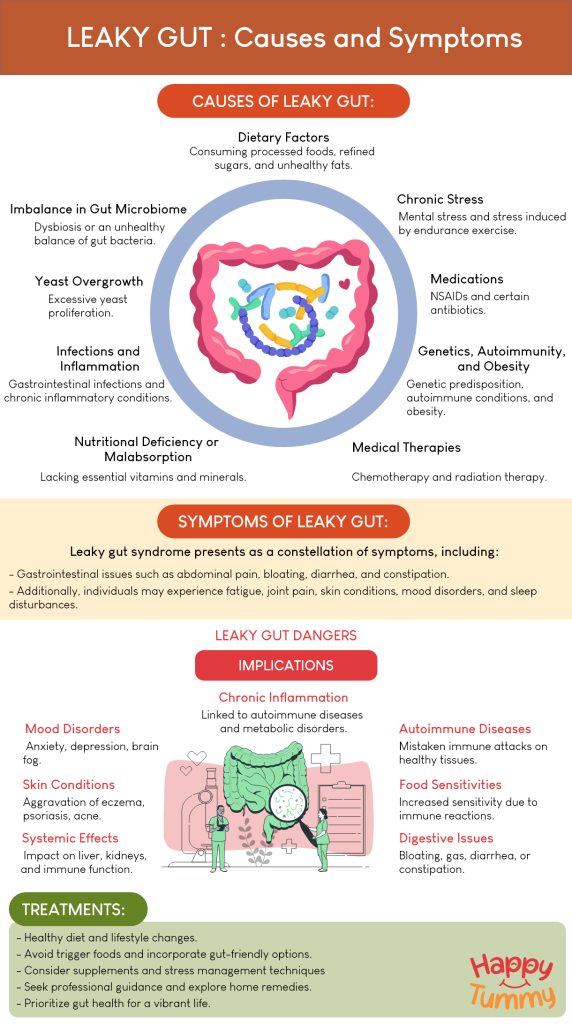Table of Contents
India and its ancient Ayurvedic tradition always revered gut health. It always emphasizes that each disease starts in the guts and guides us on what to eat when to eat, portion control, and digestive fire optimization. But sometimes things go wrong for several reasons, and problems start grappling our guts. One such culprit, often underestimated, is a leaky gut.
Today, most people suffer from leaky gut without knowing it. That post-meal bloat, unexplained stomach ache, Constant gas, constipation, upset stomachs, while all these problems can seem like simple stomach issues, might be a sign of something bigger – leaky gut.
So, what is a leaky gut? What causes it? And, could it be treated? Science has studied this leaky area well, and we’ll tell you everything it has found.
What Is Leaky Gut?
Leaky gut refers to a condition where your intestines increase permeability, become leaky and may allow toxins and other unwanted substances to pass into blood stream. But before we understand this thing completely, it is necessary to understand how our guts function.

How Human Guts Work
The journey of human digestion begins in the mouth.
- We put food in the mouth, chew, and mix it with saliva. Saliva contains enzymes that break down starches and fats.
- From there, the food travels to the stomach through the oesophagus. There, it gets further broken down by stomach acid and digestive enzymes.
- Next, the broken-down food enters the small intestine. This is where most nutrient absorption occurs. This is also the area where leaky gut syndrome takes place.
The inner wall of the small intestine contains millions of tiny finger-like projections called villi. These villi expand and increase the surface area for nutrient absorption. They take up vitamins, minerals, and other nutrients and push these into the bloodstream.
- Finally, the remaining undigested material gets pushed into the large intestine (colon). Here, water and electrolytes are absorbed and waste products are formed.
- These waste products exit the body.
Now, what causes a leaky gut? To understand this, we need to understand two things:
- Villi and gut lining
- Intestinal Permeability
The Role of Villi and Gut Lining in Leaky Gut Syndrome
Let’s understand villi and gut lining and what actually happens when they allow toxins to pass through.
Villi are tiny, finger-like projections that line the inner surface of the small intestine. These villi are so tiny that just a square inch contains 6,000 to 25,000 villi. They get closely packed to each other without any space for food to pass through the layer (or gut lining). The gut lining (also known as the intestinal epithelium) is the same layer upon which the villi stand. This wall regulates and controls what enters our bloodstream and usually allows only nutrients to pass through. [1]
Each villus contains blood vessels and lymphatic vessels that allow for efficient absorption of nutrients (such as vitamins, minerals, amino acids, and glucose) from digested food.
Understanding Intestinal Permeability
Intestinal permeability simply means how permeable the intestinal wall (gut lining) is. In simple terms, how easily does it allow substances to pass through? Think of it as a gateway. The wider it is, the more substances can pass.
Our intestine is semi-permeable and the mucous lining is designed to absorb water and nutrients from food into our bloodstream. It works with villi to absorb nutrients and fuel us with energy and essential nutrients.
Usually, the villi (those small finger-like structures) stay packed tightly and don’t allow any space for substances to pass through. However, sometimes, the gap becomes wider, and the wall becomes more porous. This is when it allows bacteria, toxins, and food particles to pass through and enter the bloodstream. And this is what we call a leaky gut.
Now, why does leaky gut syndrome happen? What causes these gaps to become wider? Let’s understand the causes behind it.
Why Does Leaky Gut Happen? The Causes Behind
Let’s start with the fact straight – no one knows the conclusive answer to what causes leaky gut syndrome. It’s a syndrome, meaning that it is a group of symptoms that have no defined cause. What is known is that in this the intestinal permeability increases. Now, there are certain cases that lead to this widening of gaps in the gut lining. These potential causes include:
- Dietary Factors
- Processed Foods – A diet high in processed foods, refined sugars, and unhealthy fats may lead to a leaky gut. [2]
- Gluten and Dairy – Some people are sensitive to gluten and dairy. This intolerance can affect gut health.
- Chronic Stress
- Imbalance in Gut Microbiome
- An unhealthy balance of gut bacteria (dysbiosis) can affect the gut lining.
- Certain bacteria may promote inflammation and permeability. [5][6]
- Medications
- NSAIDs (nonsteroidal anti-inflammatory drugs) such as antibiotics can disrupt the gut barrier.
- Long-term use may increase permeability. [7]
- Infections and Inflammation
- Zonulin and Tight Junctions
- Zonulin, a protein, regulates tight junctions between intestinal cells.
- Dysregulation of zonulin may lead to increased permeability. [10]
- Alcohol and Toxins
- Excessive alcohol consumption and exposure to environmental toxins can harm the gut lining.
- Genetics, Autoimmunity, and Obesity [11]
- Nutritional Deficiency or Malabsorption
- Several studies have found that lacking certain vitamins and minerals such as vitamins A, D, zinc, etc. can lead to a weakened intestinal lining. [14]
- Medical Therapies
- Chemotherapy and radiation therapy can sometimes injure the lining of your intestines.
- Yeast Overgrowth
- An overgrowth of yeast can sometimes cause it too [15]
Remember that research is ongoing, and individual responses vary.
Now, knowing causes never equals the knowledge of having a leaky gut. Many of us might have leaky guts but might walk unaware of this throughout our lives. So, how do we know if we have a leaky gut syndrome? Let’s look at some symptoms.
Leaky Gut Symptoms – What Does It Feel Like Having One?
As told, leaky gut syndrome is not a specific disease but a group of symptoms. If you have a group of these symptoms, it might suggest that you might have a leaky gut.
Here are the known symptoms of leaky gut syndrome:
Gastrointestinal Symptoms:
- Abdominal pain
- Bloating
- Diarrhea
- Painful indigestion due to lost gut lining
- Frequent Constipation
- Nausea specially after having food
- A burning feeling in the guts due to ulcers
- Other Possible Symptoms:
- Fatigue due to lack of nutrition and low energy
- Joint pain
- Skin conditions
- Mood disorders
- Sleep disturbances
- Memory loss
Again, remember, a leaky gut is a group of symptoms. If you have only one of these, the chances of having a leaky gut are fairly low.
If you feel like you have a lot of these symptoms, it is time to book an appointment with the doctor. He might do certain tests such as blood tests, urine tests, etc. to confirm that your gut lining is really compromised.
Now, why is it necessary to treat leaky gut? It is because a leaky gut can lead to more brutal health issues. Let’s look at what can happen if it gets left untreated.
Is Leaky Gut Dangerous? Its Implications
A leaky Gut is a sign that something is wrong within your body that needs to be treated within time. When toxins and bacteria enter our bloodstream, they cause lots more damage to our system. Let’s look at what can happen if a leaky gut is left untreated:
- Chronic Inflammation
- A leaky gut allows harmful substances (such as undigested food particles and toxins) to enter the bloodstream.
- This triggers an immune response and induces chronic inflammation.
- Chronic inflammation is associated with various health conditions, including autoimmune diseases, allergies, and metabolic disorders. This means your own body attacking itself.
- Autoimmune Diseases
- A leaky gut may contribute to the development or exacerbation of autoimmune diseases.
- When foreign substances leak into the bloodstream, the immune system may mistakenly attack healthy tissues. This is never a good news.
- Food Sensitivities
- A leaky gut can make you more sensitive to certain foods.
- Undigested proteins may cross the gut barrier and push immune reactions.
- Consequently, people develop food intolerances or allergies.
- Digestive Issues
- Chronic inflammation and altered gut permeability also derail normal digestion.
- Bloating, gas, diarrhoea, or constipation, all these are symptoms.
- Mood Disorders and Brain Health:
- The gut-brain connection gets hurt too.
- As a result, it may make one anxious, depressed, and brain fogged.
- Skin Conditions:
- A leaky gut may worsen skin conditions like eczema, psoriasis, or acne.
- In this, inflammation and immune responses play a role too.
- Systemic Effects:
- A leaky gut affects overall health. This is because bad substances from the gut can easily impact various organs and systems.
- The liver, kidneys, and immune function get hurt the most.
In short, a leaky gut is something that must be dealt with as soon as possible, because, as Ayurveda speaks, each disease starts from our guts. And when our guts are good, our life is brilliant. Now, how can we treat a leaky gut?
Leaky Gut – How to Treat It
The first line of defence against a leaky gut is always prevention. Prevention is always best. To prevent a leaky gut, try to have a healthier diet and lifestyle.
These ways written below can not only prevent a leaky gut but they can even heal your damaged gut lining to a certain level.
- Change your diet
Practising a leaky gut diet can help you protect and heal your gut lining.
- Remove what triggers you – Your system might not feel good when you introduce it to certain foods. Identify and say no to these foods as they may lead to gut inflammation. Common culprits include processed foods, refined sugars, gluten (gluten intolerance), and dairy (lactose intolerance).
- Befriend Gut-Friendly Foods:
- Bone broth – It stays rich in collagen and amino acids and can repair your gut.
- Fermented foods – Fermented Probiotic-rich options help our gut bacteria and strengthen our digestion. This means improved gut lining. A few examples include yoghurt, curd, kefir, sauerkraut, and kimchi.
- High-fibre foods – Fibre should be your favourite. Vegetables, fruits, and whole grains, all these foods provide nourishment for gut cells and help you have regular motions.
- Anti-inflammatory foods – Because inflammation causes a leaky gut, eating anti-inflammatory foods can help. Omega-3 fatty acids found in fish, flaxseed, and walnuts have anti-inflammatory properties.
2. Supplements
- L-Glutamine – This is an amino acid that supports gut lining repair.
- Vitamins and minerals – As we saw above vitamins A, D, and zinc deficiency lead to the gut lining, having these through supplements is essential for gut health and immune function. However, always try to get your nutrients from natural foods first.
- Probiotics – Taking probiotics is like increasing the gut army.
3. Manage Stress
- Stress not only leads to a leaky gut but overall poor health. It can shorten your lifespan too. So, chronic stress must be dealt with. Practice relaxation techniques like meditation, deep breathing, or yoga to keep it under the bar.
4. Sleep Well
- We all love to sleep, but rarely do we get the quality sleep we need. Quality sleep supports gut repair and overall well-being. How do you get quality sleep? Stop using phones at night, have a dark and relaxed room, avoid eating 3-4 hours prior to sleep time, and practice relaxing activities such as meditation.
5. Avoid Toxins
- Reduce exposure to environmental toxins (like pesticides) that can harm the gut.
6. Hydration
- We are nearly 60% water, and yet we don’t drink enough. Drink plenty of water to maintain gut hydration. Have at least 8 glasses (2 litres) a day.
7. Exercise Regularly
- A sedentary lifestyle leads to stress and poor metabolism, which further ruins our health. Physical activity supports gut motility and overall health. Try to hop around for at least 150 minutes a week.
8. Avoid Medications Unnecessarily
- Antibiotics, NSAIDs and taking medicines unnecessarily can disrupt your healthy gut army. Use them judiciously.
9. Know Your Food Sensitivities
- You might be sensitive to certain foods such as dairy products, gluten, etc. Eating such foods can push your body to react and lead to inflammation. A poor poor thing. If you suspect specific foods, consider an elimination diet.
10. See a doctor
- There is a time when you must see a doctor. If you feel the symptoms are becoming chronic, consult a registered dietitian, gastroenterologist, or functional medicine practitioner.
11. Home-made remedies
- Using digestive herbs to strengthen the gut like fennel and turmeric.
Remember that healing the gut lining takes time, consistency, and individualized care.
The Bottom Line
The health of our guts decides how joyful we are. A leaky gut is one such syndrome that puts our gut health on the edge of a sword. In a leaky gut, our intestinal walls become porous and allow toxins and undigested food particles to leak into the bloodstream. The result? A chain of health problems such as chronic inflammation, autoimmune diseases, and food sensitivities.
Although the exact cause of leaky gut is unknown, there are a number of factors that can contribute to it. Poor diet, stress, sugar, inflammation, alcohol, infection, medications, etc., all these things may make your gut leak.
When it comes to treatment, there is no one-size-fits-all. A holistic approach does work. Try to make dietary changes, practice stress management, and consume gut-supportive supplements. If you suspect you have a leaky gut, it’s time to see a doctor.
FAQs
A leaky gut syndrome is a group of symptoms that include chronic painful indigestion, bloating, gas, diarrhoea, fatigue, nausea, constipation, etc.
Leaky gut has no smell. It is a condition in which the gut barrier weakens and allows toxins, bacteria, and other harmful particles to pass from the intestines into the bloodstream.
Studies have shown that eating certain foods increases our chances of getting a leaky gut. For example, consuming alcohol, refined sugar, gluten, dairy products (in those with lactose intolerance), etc.
Probiotics do help in healing leaky gut by strengthening the good gut bacteria. Eat probiotic-rich foods such as curd, kefir, yoghurt, etc.















